Feb 2020 1st Edition
Feb 2020 1st Edition Londekile
Translations
4IR entrepreneurs power ahead
4IR entrepreneurs power ahead angenithaAs South Africa moves towards the Fourth Industrial Revolution(4IR) entrepreneurs now have a space to develop their solutions which will take the country forward. The Fourth Industrial Revolution Incubator (4IRI) is aimed at helping entrepreneurs maximise the opportunities in the technological development space.
CEO of the 4IRI Naomi Musi said the incubator gives entrepreneurs the opportunity to develop capability and capacity in the digital learning industry.
She said to enable the jobs of the future, new, relevant and critical skills are essential.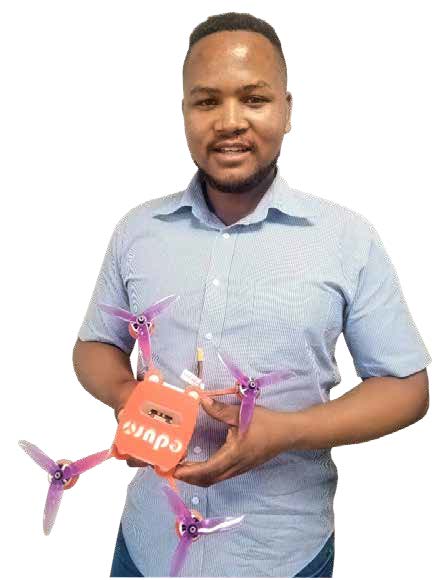
Entrepreneur Makhosonke Kwaza (28), who owns industrial and education technological innovation company Thusong Technologies, works from the incubator’s offices in Melrose, Johannesburg.
Thusong Technologies is involved in education and training. It develops solutions for learners to practically understand scientific and technological concepts by developing models which they can interact with.
“I also design education interactive exhibits, which are basically models that are used by science and training centres,” he said.
Thusong Technologies has also partnered with Innovative Telecommunications to design a product called Share AR, which converts from a normal office boardroom table into an interactive table with the click of a button.The incubator has
helped Kwaza by giving him space to work on his inventions, as well as marketing his many creations.
The incubation programme offers a number of services to qualifying entrepreneurs, including business development programmes, facilitation of access to funding, accounting and bookkeeping, regular visits by a business development officer, training, technical advice, product modelling and prototyping, access to markets, linkages to industry experts and marketing.
The incubator’s offices give entrepreneurs access to hot desks, boardrooms, meeting spaces, fast uncapped fibre connectivity, access to smart technology and prototyping facilities.
Companies interested in using the incubator must meet a set of requirements. These include being technology-based, offering solutions and being ready to expand. They must have a sound business case and their solutions or products must have the potential to uplift society.
The incubator works in partnership with the Council for Scientific and Industrial Research (CSIR), the Russian Trade Council, Small Enterprise Development Agency Seda and private businesses in the technological space.
To find out more about the 4IRI call 010 109 1769 or visit www.4iri.co.za.
Be aware of bogus colleges
Be aware of bogus colleges angenithaThe start of the new academic year has again seen bogus, fly-by-night higher education colleges and institutions trying to lure unsuspecting students.
The Minister of Higher Education, Science and Technology, Dr Blade Nzimande, has warned students and their parents to be careful of illegal or fly-by-night colleges as they are not registered as institutions of learning with the correct Sector Education and Training Authorities, the Department of Higher Education and Training and other relevant bodies.
“These institutions lure and mislead prospective students into believing that they offer qualifications that are recognised by the South African Qualifications Authority,” Minister Nzimande explained.
“They offer compromised qualifications, which are not recognised for employment purposes or for further studying,” he added.
Unregistered institutions take advantage of recognised institutions’ stringent entrance requirements and allow students who do not meet the criteria to enrol.
They are also known to change premises often, to avoid being traced. The Minister confirmed that the department has been successful in shutting down many of these illegal operators, but said that there are still many students who continue to register and are unlawfully granted fake qualifications.
“The number of illegally operating colleges has decreased tremendously over the years due to our monitoring awareness campaigns and our collaboration with print and electronic media,” Minister Nzimande said.
He added that the department is working closely with law enforcement agencies to ensure that these colleges are closed down.
Ask for registration evidence
Minister Nzimande urged prospective students to ask higher education institutions for evidence that they and their programmes are registered and accredited. If they are registered, they will be able to provide a certificate of registration and a registration number, both issued by the department.
The Minister added that before students enrol, they should make sure that the institution offers learning programmes and qualifications at the level at which they want to qualify. In some instances, they are only accredited for certain programmes or their registration is still pending or provisional, he explained.
Students should also not pay any registration or other fees until they have confirmed that the institution is properly registered and accredited.
Students can check a college or institution’s registration status with the department, by calling its toll-free number 0800 872 222. They can also view the Register of Private Colleges on the department’s website www.dhet.gov.za/resources/registers.
Changing lives of youth at risk
Changing lives of youth at risk LondekileChrysalis Academy (CA), a youth development initiative, has transformed the lives of a number of Western Cape youngsters over the past two decades.
The academy is an initiative of the provincial government and was established in 2000. It runs a three-month residential programme for youth aged between 18 and 25.
It targets youth at risk who may be unemployed, come from troubled backgrounds or have had problems with drug and alcohol abuse.
The programme includes life skills, outdoor activities, vocational and work readiness training plus therapeutic care aimed at supporting youth at a psychosocial level.
Graduates from the academy also get a 12-month work placement opportunity to acquire work experience.
The academy has upskilled and provided opportunities to over 10 000 students since its inception.
“I was sitting at home and frustrated by unemployment when I learnt about the academy," said CA graduate Anathi Makhendlana (27), who lives in Zwelihle in Hermanus.
In 2016, following Makhendlana’s earlier graduation, the academy helped him to find a job as a law enforcement officer in Hermanus.
“I only stayed on the job for about a year and then returned to the CA to work as a junior instructor. I have recently been promoted to senior instructor,” he said.
Currently, 220 young people are part of the programme.
CA recently held its 20th anniversary, at which Chief Executive Officer Lucille Meyer said the academy’s mission remains to provide a platform for youth to deepen their resilience and unleash their potential through mental, physical, emotional and spiritual development.
“This helps them to be role models and agents of positive change in our society,” said Meyer.
She said in 2020, the academy hopes to create more Youth Hubs in communities to support its graduates and play an active role in the Western Cape Safety Plan.
“We will also work with the Department of Economic Development and Tourism to explore a range of work opportunities for graduates,” she said.
Western Cape Premier Alan Winde congratulated the academy on its milestone.
“I am delighted and encouraged to see the success of this initiative, and to see the development of young people who will play an important role in shaping society and building a safer Western Cape,” he said.
To enquire about this initiative, dial 021 712 1023 or email info@chrysalisacademy.org.za
Countdown to the release of matric results
Countdown to the release of matric results tsoanaThe Class of 2019 matriculants are expected to be glued to their television screens tonight as Basic Education Minister Angie Motshekga announces the national results of the 2019 National Senior Certificate matric exams.
The Independent Examinations Board (IEB) announced the private schools’ matric results at midnight last night.
The Basic Education Department will release the state National Senior Certificate (NSC) matric exam results this evening during a live broadcast from Vodaworld in Midrand, at 6pm.
The 2019 NSC examinations – which saw 790 405 candidates sitting for 147 question papers in 7 416 examination centres nationwide - successfully concluded in November 2019.
Tomorrow newspapers will sell out as parents and family members of matriculants buy newspapers in order to search for their loved one’s results. Learners will be able to head to their schools to find out how they fared in their exams - for what will for many be the last time they walk through school corridors.
The exam period went smoothly with only a few incidents reported across the various examination centres.
On the first day of exams load shedding affected learners writing the Computer Applications Technology (CAT) and Information Technology Practical examination. They were given the opportunity to write the paper at a later stage.
Service delivery protests also disrupted writing in the North West which led to the relocation of learners to other examination centres.
Meanwhile, the marking of scripts concluded on 14 December 2019.
The Council for Quality Assurance in Education and Training (Umalusi) has given their stamp of approval for the release of the NSC results.
Umalusi Chairperson John Volmink recently said the 2019 national examinations went smoothly without any systemic irregularities.
Umalusi’s quality assurance process focused on the external moderation of question papers for all subjects/ learning areas across all qualifications and assessment bodies.
It also focused on the verification of a sample of site-based assessment (SBA) marks, monitoring of the assessment bodies’ state of readiness to conduct and manage the 2019 national examinations, monitoring the conduct of examinations, monitoring and verification of marking as well as standardisation of results.
Once matriculants receive their results, focus will turn to Higher Education as the class of 2019 prepares for the next step in their education.
SAnews.gov.za
Designing clothes for the blind
Designing clothes for the blind LondekileBalini Naidoo (28) believes that being a fashion designer is not only about creating clothes that are trendy but is an opportunity for her to address social challenges that are close to her heart. 
This is why she started her ground-breaking fashion line called Balini, which she named after herself. It is unique because while the outfits will appeal to everyone, they have been designed with the visually impaired in mind.
“The clothes I create have a braille identification system to help people who are visually impaired choose their own outfits,” she explained.
Naidoo was a fashion and textile student at the Durban University of Technology in 2014 when she noticed how a distant uncle with failing eyesight battled to choose his clothes without help.
She felt inspired to do something to help people in a similar predicament and by thinking out of the box, was inspired to create her now iconic braille-identification fashion label.
After completing her diploma, she enrolled for a BTech in Fashion and Textile and only started working on her research and creating her fashion line in 2018.
“As part of my studies, I started working very closely with the KwaZulu-Natal Blind and Deaf Society, which helped me to read, understand and translate braille,” she said.
The braille identification system, provides information on the colour and size of the clothing item, as well as details on how to care for it. Her garments are also reversible.
In the same year, she had an opportunity to attend Design Indaba, at which she was chosen as one of the emerging designers to showcase her creation.
“I received positive feedback because visually impaired people had not before had clothes that were specially designed for them,” she said.
Design Indaba unbuttoned new opportunities and Naidoo’s brand has been extensively showcased.
However, Naidoo said her journey was not always easy. She has dyslexia which made her academic career challenging.
“It was difficult for me to get my lecturers to understand my research topic for my BTech. Conceptualising it was difficult but at the end of the day, I graduated cum laude,” she said.
Drop your guns - and you won't be charged
Drop your guns - and you won't be charged JoyPeople who are in possession of illegal guns can hand them over at their nearest police station without being arrested.
Minister of Police Bheki Cele declared a firearms amnesty from 1 December 2019 to 31 May 2020. The amnesty means anyone who voluntarily hands over an unlicensed or illegal firearm to the police will not be charged.
Minister Cele has urged gun owners to take advantage of the amnesty programme.
He said since the beginning of the amnesty period over 2000 firearms have been surrendered to the police. Gauteng leads with 527 firearms surrendered to date. It is followed by the Western Cape (514), KwaZulu-Natal (309), Limpopo (252), Eastern Cape (189) Mpumalanga (173), Free State (163) Northern Cape (48) and North West (91).
“It is important to note that during this amnesty period, there will be no indemnity for firearms handed over which have been used to commit crime,” he said.
Minister Cele’s sentiments where shared by the SAPS head for Firearms, Liquor and Second-Hand Goods Control (FLASH) Major-General
Maropeng Mamotheti.
Mamotheti said the amnesty was declared in terms of Section 139 of the Firearms Control Act of 2000.
She warned that firearms surrendered as part of the amnesty will be subjected to ballistics testing to determine if they had been used in a crime.
When a person surrenders a firearm at a police station, they will have to complete 522 (A) and 522 (B) forms, said Mamotheti. The first form is to indicate that you are voluntarily surrendering the firearm and the second form indicates that you do not want the firearm back.
Once you have filled in these forms, a police officer will fill out a 548 form to indicate whether or not you want apply for a licence for the firearm, she said. Licence applications must be lodged within 14 days of handing over the firearm.
Mamotheti said in the 2018/2019 financial year,
9 609 firearms were reported as stolen. The police recovered
7 503 of these, she said.
Information regarding the Firearms Amnesty can be obtained at any police station or on the SAPS website: www.saps.gov.za. Alternatively, call the Central Firearms Register’s enquiry desk on its 24-hour line: 012 353 6111.
Early childhood education boosted in Upington
Early childhood education boosted in Upington SiboneloChildren from Upington in the Northern Cape are benefiting from 10 early childhood development (ECDs) centres recently launched by the Department of Social Development (DSD).
Five-year-old Lithemba Bacela, who lives with cerebral palsy and has a speech impairment, is better able to indicate what she feels and needs, thanks to her time at one of these centres, Oasis Skills Development Centre’s ECD unit.
Lithemba lives in Paballelo with her mother, Elizabeth Bacela, who said her child’s communication skills have improved since she started at the centre last year. Elizabeth said the stimulation area has been particularly beneficial.
“Lithemba can now indicate when she is thirsty, hungry or has wet herself”.
The Oasis ECD centre is one of 10 that received a new building from the National Lotteries Commission (NLC) as part of the commission’s Legacy Project. This countrywide initiative is aligned with the National Development Plan’s commitment to improving education, innovation and training, and contributing to the goal of ensuring that all children have at least two years of preschool education.
The centre accommodates children who live with a variety of conditions, including autism, down syndrome, cerebral palsy and foetal alcohol syndrome. Each of the four classes at the ECD centre has 10 to 15 pupils, says Acting Chairperson of Oasis Skills Development Centre Marina Johannesen.
The department contributes a subsidy of R20 per child, which covers children between the ages of two and seven and those who are 18 years of age and above.
In 2015, the DSD donated a stimulation centre, computer lab and a bus to transport pupils to and from school.
“Once a week, therapists from the local hospital come to the centre to assess and treat the children,”says Johannesen. The new building, donated recently is an additional blessing for the centre. Speaking at the launch, Department of Social Development Deputy Minister Hendrietta Bogopane-Zulu called on the public to include children living with disabilities in dialogues about issues that affect them.
Ectopic pregnancy is a medical emergency
Ectopic pregnancy is a medical emergency angenithaWomen who have experienced an ectopic pregnancy are well aware of the heartache that it causes, due to a positive pregnancy result in urine and blood tests.
This is according to Dr Bushy Mhlari, the Senior Registrar Ectopic Obstetrics and Gynaecology at Dr George Mukhari Academic Hospital, who explained that an ectopic pregnancy is not located in the cavity of the uterus, where a pregnancy is normally located.
He said that normally, after fertilisation of the egg by the sperm - which occurs inside the fallopian tube, the fertilised egg travels through the tube to the rich uterine cavity where it attaches to the endometrial lining and the baby develops.
“In ectopic pregnancies, the fertilised egg implants on other body surfaces. In 98 percent of cases, the location of ectopic pregnancies is in the fallopian tubes. Uncommon locations include the ovary, abdominal cavity, cervix and the broad ligament,” said Dr Mhlari.
When this happens, the embryo cannot be transplanted and ending the pregnancy is the woman’s only option.
Dr Mhlari said a woman has a higher chance of an ectopic pregnancy if she has;
- damaged or abnormal fallopian tubes, such as from past tubal infections from sexually transmitted infections or tubal surgery;
- had a previous ectopic pregnancy;
- has infertility;
- has multiple sexual partners;
- smokes cigarettes.
“Ruptured ectopic pregnancy is a life-threatening condition and is the leading cause of pregnancy-related maternal death in the first three months of pregnancy. The incidence of ectopic pregnancy is approximately two percent in the general population,” said Dr Mhlari.
Signs of an ectopic pregnancy
According to Dr Mhlari, the symptoms appear early in pregnancy. Sometimes, even before the woman realises that she is pregnant. Common symptoms include;
- lower abdominal pain;
- a missed menstrual period;
- vaginal bleeding;
“However, some women have no symptoms until the fallopian tube ruptures. When this happens, the woman may experience severe pain and some may have vaginal bleeding. This is followed by dizziness, a drop in blood pressure, fainting, shock and death if treatment is delayed,” he said.
To diagnose an ectopic pregnancy, a blood or urine pregnancy test is done to confirm that the woman is pregnant. “An ultrasound is then done to confirm if the uterus is empty and to see where the embryo is in the woman’s body,” said Dr Mhlari.
Treating an ectopic pregnancy
“Once an ectopic pregnancy is diagnosed it must be treated to stop its growth, because the woman’s life is at risk if treatment is delayed,” said Dr Mhlari.
“Surgery remains the first choice treatment of an ectopic pregnancy, however, early diagnosis allows the option of medical treatment before the ectopic pregnancy ruptures,” he added.
Dr Mhlari said that a woman can still conceive after an ectopic pregnancy.
Women who suspect that they have an ectopic pregnancy must consult their general practitioner, local hospital or clinic as soon as possible.
Ectopic pregnancy is a medical emergency
Ectopic pregnancy is a medical emergency UrsulaThe medical complications of ectopic pregnancies bring much heartache to expecting mothers. 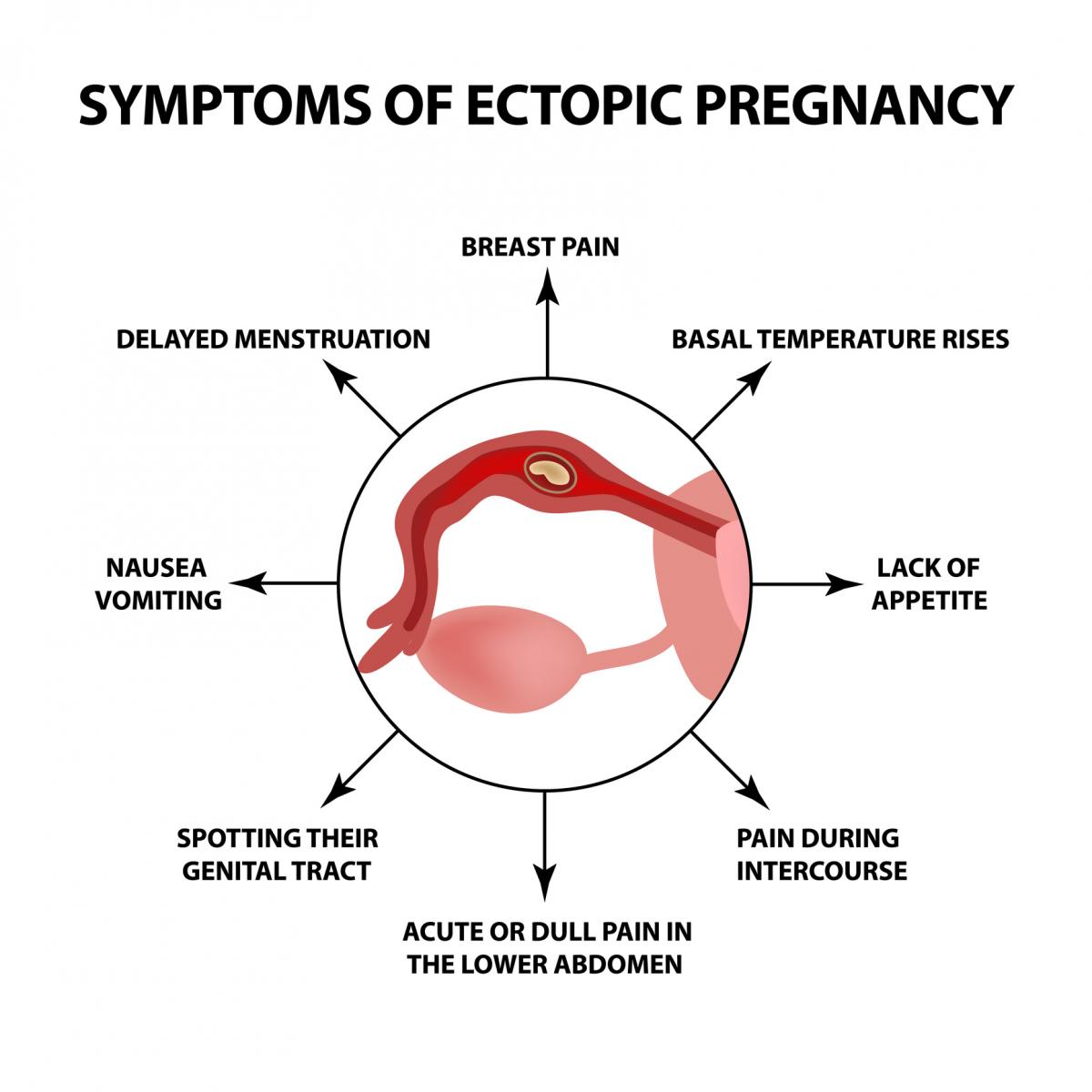
This is according to Dr Bushy Mhlari, the Senior Registrar Ectopic Obstetrics and Gynaecology at Dr George Mukhari Academic Hospital.
“In ectopic pregnancies, the fertilised egg implants on other body surfaces. In 98 percent of cases, the location of ectopic pregnancies is in the fallopian tubes. Uncommon locations include the ovary, abdominal cavity, cervix and the broad ligament,” said Dr Mhlari.
When this happens, the embryo cannot be transplanted and ending the pregnancy is the woman’s only option.
He explained that an ectopic pregnancy is not located in the cavity of the uterus, where a pregnancy is normally located.
Adding that normally, after fertilisation of the egg by the sperm - which occurs inside the fallopian tube, the fertilised egg travels through the tube to the rich uterine cavity where it attaches to the endometrial lining and the baby develops.
Dr Mhlari said a woman has a higher chance of an ectopic pregnancy if she has;
- damaged or abnormal fallopian tubes, such as from past tubal infections from sexually transmitted infections or tubal surgery;
- had a previous ectopic pregnancy;
- has infertility;
- has multiple sexual partners;
- smokes cigarettes.
“Ruptured ectopic pregnancy is a life-threatening condition and is the leading cause of pregnancy-related maternal death in the first three months of pregnancy. The incidence of ectopic pregnancy is approximately two percent in the general population,” said Dr Mhlari.
Signs of an ectopic pregnancy
According to Dr Mhlari, the symptoms appear early in pregnancy. Sometimes, even before the woman realises that she is pregnant.
Common symptoms include;
- lower abdominal pain,
- a missed menstrual period;
- vaginal bleeding.
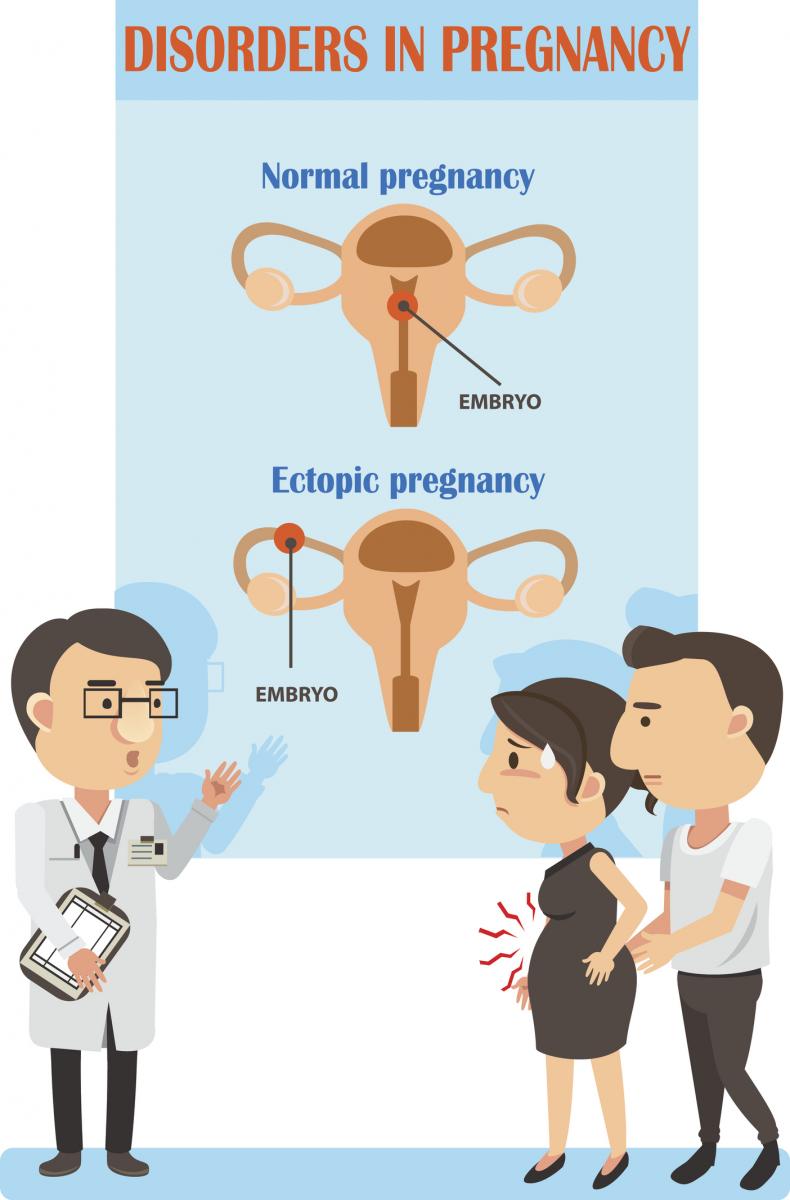 “However, some women have no symptoms until the fallopian tube ruptures. When this happens, the woman may experience severe pain and some may have vaginal bleeding. This is followed by dizziness, a drop in blood pressure, fainting, shock and death if treatment is delayed,” he said.
“However, some women have no symptoms until the fallopian tube ruptures. When this happens, the woman may experience severe pain and some may have vaginal bleeding. This is followed by dizziness, a drop in blood pressure, fainting, shock and death if treatment is delayed,” he said.
To diagnose an ectopic pregnancy, a blood or urine pregnancy test is done to confirm that the woman is pregnant. “An ultrasound is then done to confirm if the uterus is empty and to see where the embryo is in the woman’s body,” said Dr Mhlari.
Treating an ectopic pregnancy
“Once an ectopic pregnancy is diagnosed it must be treated to stop its growth, because the woman’s life is at risk if treatment is delayed,” said Dr Mhlari.
“Surgery remains the first choice treatment of an ectopic pregnancy however, early diagnosis allows the option of medical treatment before the ectopic pregnancy ruptures,” he added.
Dr Mhlari said that a woman can still conceive after an ectopic pregnancy.
Women who suspect that they have an ectopic pregnancy must consult their general practitioner, local hospital or clinic as soon as possible.
Ekurhuleni supports emerging entrepreneurs
Ekurhuleni supports emerging entrepreneurs LondekileLabani Mgimeti’s catering business Hiteka Kitchen recently won R40 000 worth of equipment during the City of Ekurhuleni’s Festival of Ideas Programme.
The initiative aims to support emerging businesses, to help them grow and boost Ekurhuleni’s economy. More than 15 emerging entrepreneurs received prizes worth R2 million in 2019.
The entrepreneurs had to pitch their ideas in sectors including agriculture, logistics, business services manufacturing and information communication technology.
Mgimeti (36) established her business in 2017 as an events management company, but decided to shift its focus to promote healthy eating amongst children. The business was inspired by the realisation that many people do not pay attention to the importance of eating healthy food, she said.
“Our children are prone to eating unhealthy food daily, such as fat cakes and other junk food. We know they are not born craving this food, but their bodies are conditioned to it over time. This needs to change,” Mgimeti said.
“Unhealthy food can affect a child’s performance at school. If they consume a lot of sugar, they become hyperactive and sometimes cannot concentrate. But if they eat healthy food packed with nutrients, they feed their bodies what is needed,” she added.
The company, which targets public schools, initially ran a canteen at Norkem Park High School but has since branched out to Sir Pierre van Ryneveld in Kempton Park as well. It employs four permanent and three temporary workers and sources fresh produce from fruit and vegetable markets and farmers.
As part of the prize, Hiteka Kitchen received a gas griller and a camera.
“We were using a small stove, which affected the pace of preparing meals. The gas griller will assist us to be more efficient. We will use the camera to take photos of our work and upload them to social media,” said Mgimeti.
The City of Ekurhuleni worked with the Gauteng Enterprise Propeller (GEP) to put together the total prize money. It contributed R1.5 million, while the GEP contributed R500 000.
Ekurhuleni’s MMC for Finance and Economic Development Nkosindiphile Xhakaza said it is important to support emerging businesses to ensure they have a conducive environment for their businesses to prosper.
For more information about this programme contact the City of Ekurhuleni on YouthSummit@ekurhuleni.gov.za
Football club keeps youth off the streets
Football club keeps youth off the streets LondekileLion Stars FC in Joe Slovo Park, Cape Town, has helped a handful of youngsters kick life-destroying habits.
Owner Khayalethu Dyani (49) said his club saved a youngster who was living on the streets, as well as three others who were heavily involved in drugs.
“Three players got involved with drugs and gangsters while they were playing for us but we managed to help them correct their path. In the team, we also have a player who was living on the streets and who was addicted to drugs. After he joined our team, he cleaned up his act and is now an active church member in our community,” said Dyani.
Started in 2014 by Dyani, Lion Stars FC was created specifically to help keep young people away from drugs and gangsterism.
“The parents of many children in my neighbourhood had given up on them because of drugs,” he said.
Myolisi Tapile (17), who plays for Lion Stars’ senior team, said he used to smoke marijuana with his peers. Tapile said he quit the team for some months because drugs had taken control of him.
“I started smoking marijuana because it seemed cool. At some point, I got so heavily involved in drugs that I quit playing soccer. Fortunately, I later realised that soccer was a tool to success,” Tapile said.
He said when he returned to the soccer field, he had to work twice as hard to earn his place in the team as he was in poor health. Tapile said in his Joe Slovo community, drugs such as tik and mandrax are easily accessible and a large number of his peers are using them.
Dyani believes that in order to curb social ills, community members must play an active role in promoting positive activities, such as sport.
“We must find out what young people are interested in and get them active in those areas. It helps no one to insist that they do things that don’t interest them at all,” he said.
The club plays in the Milnerton Local Division and has Under 12, Under 14 and Under 16 teams, as well as a senior team.
From boys to good men
From boys to good men Estelle GreeffA Limpopo organisation is determined to help shape boys on their journey to becoming courteous, respectful and honourable men.
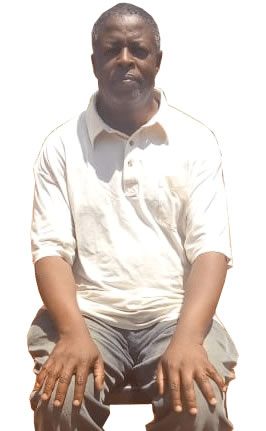 Teaching young men how to behave is crucial to ending gender-based violence (GBV).
Teaching young men how to behave is crucial to ending gender-based violence (GBV).
This is the message preached by a Limpopo-based non-governmental organisation (NGO) called Malebo “A” moledi which means the care givers gratitude in Sepedi. The organisation works with communities to guide young boys raised by single parents. Director Lekgalwa Moloto believes the shaping of boys’ conduct is important as it informs their behaviour as adults.
“Single parents are busy and sometimes don’t have the time to monitor the behaviour of their children. As an organisation, we assist parents by fostering behaviour change,” Moloto said.
Sekhukhune resident Kholofelo Bokgobelo (28) said thanks to the NGO, he quit smoking marijuana and realised he has to protect women and children from abuse. “Malebo “A” moledi taught me to not abuse women and children. They are very important in the betterment of our society,” Bokgobelo said.
He said working with the organisation inspired him to play an active role in ending GBV.
Malebo “A” moledi’s strategy is built around a 10-point plan:
- Love: Boys are taught to love themselves.
- Parental care: Parents are coached to show they care.
- Responsibility: Young men are taught to be responsible for their own lives.
- Refreshment and education: This, Moloto said, helps to constantly remind young men how to behave.
- Respect others: Boys are educated to treat others, especially women, with respect.
- Language: The importance of proper language at home and in society is highlighted.
- Appropriate toys: Parents are guided on the importance of appropriate toys. “If you give boys a gun to play with, then you must expect violence,” Moloto said.
- Friends and relationships: The importance of choosing the right type of friends is emphasised.
- Empathy: Boys are given lessons on showing empathy for others but not to condone bad behaviour.
- Dialogue: Parents need to openly communicate with their children.
The organisation, which counts the provincial Department of Social Development as one of its partners, visits schools and communities to engage young people. Moloto said they also work with village elders to ensure that their teachings are passed down the generations.
Furniture-maker nails it
Furniture-maker nails it vuyelwanSipho Twala is a young furniture-maker who has gone from being unemployed to showcasing his beautiful creations at national and international exhibitions.
Twala is one of over 1 000 people who have been empowered to succeed through the Furniture Technology Centre Trust (Furntech).
Supported by the Small Enterprise Development Agency (Seda), Furntech offers support to existing and start-up businesses in the furniture industry. The organisation targets a number of groups to be a part of its programmes, including unemployed people with a passion for furniture or woodwork.
Eighty-eight percent of Furntech’s clients are black-owned companies. More than 710 SMMEs are currently supported and 310 businesses have been started from the incubation programme itself. Furntech has also trained almost 7 000 learners, while creating 2 000 direct and indirect jobs.
Twala is one of the entrepreneurs who have made strides. In 2014, he trained in wood-machining and cabinet-making through a project offered by the Gauteng Growth and Development Agency.
“At that stage, I was unemployed, but I always had a passion for woodwork and design. When I completed the training, I started a co-operative with four other youngsters, but it did not succeed,” said Twala.
He subsequently found employment in the furniture industry, working as a machinist and learning new skills.
“My goal has always been to start and run my own business, but I did not have enough experience in the industry or the support I needed. In 2018 I started talks with the Furntech centre in Johannesburg. I was accepted into the incubation programme, I took a leap of faith and resigned from my job.”
Being part of the programme gave Twala access to a fully-equipped workshop, valuable business training, mentoring and marketing opportunities. In early 2019, his company Khwebula Arts was officially registered. Since then, his modern African furniture has been displayed at numerous exhibitions and is for sale at various local stores. He has also been invited to attend an exhibition in Milan, Italy, in April 2020.
*For information about Furntech, visit www.furntech.org.za.
GBVF complaints line opened
GBVF complaints line opened UrsulaYou can now formally lodge complaints if GBVF cases are not handled efficiently. 
Citizens who are not satisfied with the services rendered by the South African Police Service (SAPS), especially with regard to Gender-Based Violence and Femicide (GBVF), are encouraged to lodge complaints.
This is according to National Police Commissioner General Khehla Sitole, who says the SAPS has prioritised the handling and investigation of GBVF-related complaints and cases.
“The purpose is to ensure a continued and sustained professional service and consequence management for poor performance by any of our policemen and women,” Sitole said.
“The reporting of any or all poor service will help SAPS management ensure that citizens receive the desired help,” he added.
According to Sitole, SAPS management has enhanced its service complaints mechanisms. He explained that every provincial commissioner, in all nine provinces, has a similar platform, the details of which can be accessed on the SAPS website.
Complainants can submit a complaint directly, by visiting their local police station’s community service centre, station commander, district/cluster commander’s office or the provincial complaints co-ordinators inspectorate.
Service complaints can also be lodged at the National Service Complaints Call Centre at 080 033 3177 or by email at complaintsnodalpoint@saps.gov.za.
Complaints can be lodged here:
Eastern Cape: 040 608 7078 / complaintsEC@saps.gov.za
Free State: 051 411 7804 / fs.inspect.nodal@saps.gov.za
Gauteng: 011 274 7786 / gpcomplaints@saps.gov.za
KwaZulu-Natal: 031 325 5951/4886 / kzn.complaintscentre@saps.gov.za
Limpopo: 015 293 7186 / Lim.complaints@saps.gov.za
Mpumalanga: 013 249 1429/1430/1435 / complaints.mp@saps.gov.za
Northern Cape: 053 802 7416 / ncprov.complaint.saps@saps.gov.za
North West: 018 299 7057 / nw.inspect.complaints@saps.gov.za
Western Cape: 021 409 6535 / wcmi.complaintsnodalpoint@saps.gov.za
Get involved, fight corruption
Get involved, fight corruption angenithaThe fight against corruption is not a battle that can be won by the public sector alone.
The head of the Special Investigating Unit (SIU), Advocate Andy Mothibi, encourages members of the public to contact the SIU if they are aware of fraud, corruption or maladministration.
The SIU, one of the key law enforcement agencies under the Department of Justice and Correctional Services, investigates allegations and collects evidence relating to these acts to build a case against the perpetrators, Mothibi explained.
“Our organisation plays a vital role in fighting fraud, corruption and maladministration in cases where state funds have been lost. It also enforces anti-corruption legislation and encourages good governance practices within state institutions,” he said.
The organisation also plays a critical role in preventing future state losses.
“If there is a private sector player involved in corrupt activities with the public sector, the SIU will channel the same process of recovery,” said Mothibi.
“The SIU is committed to clean governance and putting integrity at the centre of our work,” he added.
According to Mothibi, SIU investigations are determined by the President, as stated in the SIU Act 74 of 1996.
Before the President can sign a proclamation to have a case investigated, allegations or complaints must first be received.
“Any member of the public can approach the SIU with allegations. The SIU then assesses the allegations to establish if they fall within the ambit of the SIU Act. If they do, the SIU then determines if sufficient information exists to issue a proclamation by the President, mandating the SIU to conduct an investigation,” Mothibi explained.
He said key to the assessment is the availability of information detailing the allegation. The SIU is not empowered to investigate to obtain this information, unless an investigation was authorised by a Presidential proclamation.
Keeping an eye on State Capture Inquiry
With regard to testimony that comes from the Commission of Inquiry into State Capture, Mothibi said the SIU’s governance committee analyses evidence to check if they fall within SIU processes.
“If they fall within SIU processes, we will apply for a Presidential proclamation. If approved, we will ensure there are consequences for those who have been implicated,” he said.
Blow the whistle on corruption
- Educate yourself about the dangers of corruption.
- Spread the word and educate others about corruption.
- Become an anti-corruption advocate by forming groups in your organisation and community, and campaign for increased anti-corruption efforts.
- Report corruption on the SIU anonymous whistle-blower hotline at 0800 037 774 or email siu@whistleblowing.co.za
Inspiring the fatherless
Inspiring the fatherless Estelle GreeffSharing his story of growing up with an absent father changed the course of Charley Pietersen’s life.
 In 2015, Pietersen launched his autobiography, ‘Growing up without a father’.
In 2015, Pietersen launched his autobiography, ‘Growing up without a father’.
“After the launch, I would visit schools to tell young boys that they can become responsible human beings even in the absence of their fathers. I shared my life story with them through the book and inspirational talks,” he said.
His talks were so inspiring that Pietersen was encouraged to start an organisation to enable him to reach more youngsters, and so the Growing Up Without a Father Foundation was born.
He co-registered the organisation in 2016 with his wife Brenda Pietersen and it has already reached thousands of young boys and men through various platforms, including seminars and workshops in different provinces. One of the foundation’s main aims is to raise awareness of the impact that absent fathers have on society.
He said everyone involved in the organisation’s work is a volunteer, many of whom grew up fatherless.
The organisation also pays scheduled visits to prisons to try and change the mindset of convicts with regard to women and girls.
Having worked in the soccer fraternity as the Chief Executive Officer of Bloemfontein Celtic FC, Pietersen gives male role models, such as soccer players, a platform to speak out about the responsibilities of men in society.
It is important for men to realise that young boys look up to them and copy how they treat girls and women, he stressed.
“I focus mainly on young boys because they feel neglected. For many years, we focused on the wellbeing of girls and it is time we also show our boys love and attention. It is important to tell a boy that his life matters,” he says.
He added that a lot of boys and men live with depression and are suicidal because they do not know how to express their emotions. Some of them resort to violence as a way of dealing with their emotions. This is because society has taught them not to cry, and it is dangerous because most social ills stem from that ideology,” he added.
Pietersen believes that every man was born good and that behaviour is learned. He said lack of guidance is what leads to boys and men becoming a danger to society
It’s a ‘fishy’ business for Khashane
It’s a ‘fishy’ business for Khashane UrsulaFarmed fish could be the answer for South Africans looking for a cheaper source of animal protein. 
A 32-year-old entrepreneur, Morena Khashane, is determined to not only produce fish for South African communities, but to spread awareness of the industry and the nutritional benefits of this healthy, resource-efficient protein.
He owns MK Enterprise Fish Farming (Pty) Ltd, which is based in Rooigrond in the North West and specialises in tilapia fish farming.
He said his business has created one permanent employee and 10 temporary workers.
Khashane underwent training in Aquaculture at Stellenbosch University. He is a member of the African Farmers’ Association of South Africa and serves on the executive committee of Tropical Aquariums.
“More than 60 percent of our fish is sold to the informal market, with the rest sold to restaurants,” Khashane said.
His business has partnerships with other fish farms in Gauteng, Limpopo and the Eastern Cape to facilitate widespread market penetration.
Last year, Khashane was awarded the Fisheries Recognition Award: Small-Scale Category at the Youth in Agriculture, Forestry and Fisheries awards. Hosted by the Department of Agriculture, Forestry and Fisheries (DAFF), the awards recognise young people who are doing well in the agriculture sector.
After graduating from Stellenbosch University, Khashane underwent training in China, Malawi and Indonesia. These courses were sponsored by Daff, he told Vuk’uzenzele.
“In China we learnt about adding value to our product, as well as market development. The training in Malawi was on running a successful business and in Indonesia we learnt more about production systems, techniques and new technologies.”
Khashane uses sustainable, water-wise farming methods. The business re-uses most of its water and does not require new fresh water daily. This motivated Khashane’s decision to farm in the North West, which is an inland area. Tilapia is a warm-water species and the province’s weather is perfect for the fish, according to Khashane.
He advises young people who want to enter the field to first make sure they have the right permits.
“You will need water rights and a transport permit for the transportation of fish. If you farm tilapia, you will need to do an environmental risk assessment because it is an alien invasive species and you will have to prove to the Department of Environmental Affairs that you won’t negatively affect the environment.”
Jobs Fund boosts agriculture and creates jobs
Jobs Fund boosts agriculture and creates jobs angenithaOnce a farm worker, Rosina Nevhutalu today owns her own successful vegetable and crop farm and is helping combat unemployment in Musina’s Tshikhudini village in Limpopo.
Her enterprise, Nevhutalu Farming and Services, employs six permanent staff members and between 20 and 30 seasonal workers.
Nevhutalu (42) worked on her brother’s farm before being granted permission from a local chief to use 25 hectares of land for farming. Today, she is her own boss and proudly produces tomatoes, green peppers and various crops.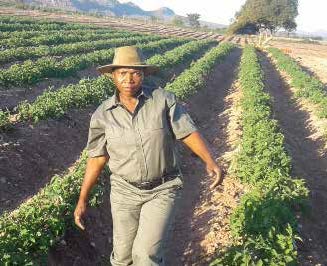
“While working at my brother's farm, I realised that there are a lot of opportunities in agriculture and I could uplift my community. This is what led me to start my own business.”
Started in 2005, the farm soon flourished, thanks to Nevhutalu’s hard work and the support she received from the National Treasury’s Jobs Fund, which enabled her to receive training in bookkeeping, financial management, chemical measurements and fertiliser usage from the Timbali Technology Incubator.
“The knowledge I gained from Timbali Technology Incubator was passed on to my employees so they have the skills required on the farm.”
She was also taught how to market her business, which has helped grow the farm’s footprint. The Jobs Fund also helped install an underground irrigation system to mitigate the effects of drought.
Nevhutalu’s tomatoes are sold to Tiger Brands and tomato sauce producer All Joy. Other vegetables produced at the farm are sold through the Nwanedi Packhouse to the local fresh fruit market and the community, as well as the Joburg Market.
Empowered and determined, the small-scale farmer hopes to begin exporting her produce.
Support for farmers
The Department of Agriculture, Forestry and Fisheries, working with the Jobs Fund, is looking to create 1 715 new permanent full-time job opportunities by supporting farmers in the livestock, industrial crops and horticulture sectors. In addition, it wants to create 3 720 new seasonal and 48 short-term jobs in agriculture.
Farmers who receive funding will be allocated a 50 percent grant and 50 percent loan, which will be administered by the Land Bank.
For information about the fund, contact Roger Tuckeldoe at RogerT@daff.gov.za or by phone at 012 319 8474. Alternatively, contact Bridget Malete at BridgetMal@daff.gov.za or by calling 012 319 8231.
More information about the fund is available on www.daff.gov.za.
Jobs: Government Communication and Information System - Feb 2020
Jobs: Government Communication and Information System - Feb 2020 LondekilePost: Chief Director: Strategic Planning and Performance Management
Ref: 3/1/5/1 – 20/02
Centre: Pretoria
Salary: All-inclusive salary package: R1 251 183 per annum
Enquiries: Ms Z Ngwenya, Tel No: (012) 473 0472
Post: Chief Financial Officer
Ref: 3/1/5/1 – 20/03
Centre: Pretoria
Salary: All-inclusive salary package: R1 251 183 per annum
Enquiries: Ms Z Ngwenya, Tel No: (012) 473 0472
Deputy Director: Systems Developer (12-months contract)
Ref: 3/1/5 – 20/04
Directorate: Information Management Systems
Salary: R733 257 per annum
Centre: Pretoria
Note: Those who previously applied do not need to re-apply
Enquiries: Ms XH Cathy Chen,Tel No: (012) 473 0043
Closing date: 7 February 2020
For more information on the requirements and functions/key performance areas of these positions, kindly visit www.gcis.gov.za.
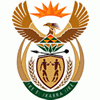
Learners become GBV activists in schools
Learners become GBV activists in schools angenithaHigh school learners in Athlone and Khayelitsha are providing support to victims and spreading awareness of gender-based violence (GBV) through a peer education programme called The Birds and the Bees.
Non-profit organisation Rape Crisis started the programme in communities where young people are often exposed to GBV in their homes and even at school.
“Of great concern is the fact that the majority of sexual offences are committed against South Africa’s youth and that many of these crimes are committed in schools, places usually considered to be safe,” explained project co-ordinator Rifqah Abrahams.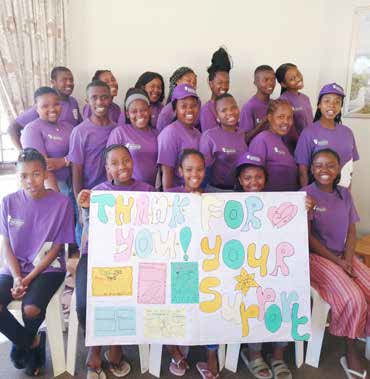
The Birds and the Bees programme works by identifying learners within high-risk schools. These learners are then trained to deliver awareness-raising activities and also to be a support resource to victims of rape or sexual harassment.
“The training is designed to offer knowledge and information about rape and to influence attitudes about rape. In this way, school learners build a shared sense of positive social norms within the school and victims feel more and more comfortable coming forward for advice and information on how to access counselling,” she said.
The peer educators are also made aware of myths involving sex.
“These myths include that you have to have sex to show love; that girls think violent boys are stronger and more desirable; that girls mean ‘yes’ when they say ‘no’ to sex and so on. These myths are upheld by both boys and girls,” said Abrahams.
Parents, educators and learners all attend the workshops so that the entire school community is involved in creating a safe, informed culture within the school. Once the workshops are complete, learners must pass a written test to become peer educators. They then attend monthly supervision meetings at Rape Crisis.
Tasneema Ismail, a peer educator in Athlone, hopes to be a voice for the voiceless.
“As a peer educator, I am the voice for other learners who cannot speak about what they have been through or who are too afraid to speak. It is very important to get more peer educators involved as learners can talk to someone who is their peer.”
If you or someone you know is a victim of sexual violence in the Cape Town area call the Rape Crisis 24-hour helpline on 021 447 1467 / 021 684 1180 for support.
NSFAS prioritises the poor in 2020 funding allocation
NSFAS prioritises the poor in 2020 funding allocation tsoanaThe National Student Financial Aid Scheme (NSFAS) will prioritise poor and vulnerable students in its 2020 funding allocation.
This comes as the Scheme announced that it had received a record number of 543 268 first-time funding applications by the end of its application period on 30 November 2019.
“We are happy to report that by November 30, 2019 the National Student Financial Aid Scheme (NSFAS) had received a record number of 543 268 first-time ever applications (prior year 428 929) by the closing date,” it said on Monday.
The (NSFAS) had embarked on a series of roadshows across the country aimed at getting prospective students to apply for funding at tertiary institutions across the country.
The scheme has prioritised poor and vulnerable students and to this end just under 50% of applications have been received from social grant beneficiaries.
“The personal details and social welfare status of all applications have been validated with the Department of Home Affairs and the Department of Social Development. This is a major improvement in NSFAS administration, as communication of funding decision prior to the commencement of the academic year will allow students to enrol at tertiary institution without having to pay upfront registration fees,” said NSFAS.
As in prior years, it is expected that a significant number of students will apply after they have registered at TVET colleges in January 2020. In the previous year the number of students in this category stood at 160 000.
NSFAS said students—it previously funded –who will be continuing their studies in 2020 will be funded based on progression results to be received from the various institutions.
“We are encouraged that most of applications were submitted through the electronic portal with only 15 000 applications submitted manually. The highest number of applications received were from KwaZulu-Natal, Limpopo and Gauteng Province. About 80% of applicants have indicated that universities are their first choice of study,” the Scheme said.
Funding decisions for the 2020 applications have been updated on the myNSFAS portal profiles. In addition the NSFAS advised applicants to check and track their application status updates online.
“Applicants who do not have the myNSFAS portal profiles are encouraged to register on the website in order to ensure they have sight of their funding status.”
Outstanding supporting documents
From the total number of applications received, 69 357 applications were incomplete or had outstanding or incorrect supporting documents.
Applicants with incomplete applications have been contacted by NSFAS over the festive season with the scheme continuing to receive the required documents.
The list of required documents which need to accompany each application is on the NSFAS website on www.nsfas.org.za.
SAnews.gov.za
No registration fee for NSFAS students
No registration fee for NSFAS students Estelle GreeffIndividuals qualifying for the National Student Financial Aid Scheme (NSFAS) do not have to pay upfront registration fees at universities or colleges.
 Higher Education, Science and Technology Minister, Dr Blade Nzimande, made the announcement recently when he was briefing the media on the implications of matriculation results on the Post School Education and Training sector in South Africa.
Higher Education, Science and Technology Minister, Dr Blade Nzimande, made the announcement recently when he was briefing the media on the implications of matriculation results on the Post School Education and Training sector in South Africa.
“The fact that for the first time NSFAS is able to say you qualify, it means therefore, when you go to register when you’ve been accepted, you’ve got proof to say, ‘I don’t have to pay registration’.
“It is also a great improvement in the system because before, you would have a number of NSFAS qualifying students being asked to pay registration fees, that we have eliminated now [and] who ever does this is breaking the law,” Nzimande said.
Nzimande said 430 000 applications have been approved for NSFAS funding.
NSFAS has received a record-breaking number of applications by the closing date of 30 November 2019, with more than 543 268 first-time applications (prior year 428 929), received from applicants across the country, with the majority of the applicants submitting applications online via the myNSFAS portal.
“Applicants include those who were in Matric in 2019, learners in Grade 10 – 11 and those intending to further studies at the TVET (Technical Vocational Education and Training) Colleges and out of school youth, returning/continuing students without NSFAS funding in prior years,” Nzimande said.
A total of 281 639 of all applications received so far are South African Social Security Agency's (SASSA) beneficiaries.
The Minister attributed the success rate in applications to an extensive outreach campaign, including partnerships with both local and provincial governments; and the private sector.
Quality of teaching and learning
Universities have been requested not to over-enrol in 2020 to ensure the appropriate infrastructure and human resources for the number of students in the system, the quality of teaching and learning and the sustainability of the university system.
Nzimande said the country’s 26 public universities will provide access to approximately 201 042 new entrants wishing to pursue their studies across all general, technical and professional fields, including Business and Management, Science, Engineering, Agriculture and Technology, Humanities, Social Sciences, the Arts and Education.
The Minister explained that all universities were required to consider their enrolments in terms of the fiscal realities and constraints, and to plan realistically, making sure that the enrolment numbers targeted, resulted in the optimum number of new students entering the system for the first time in 2020.
He added that the universities should be fully supported through available infrastructure and sufficient qualified lecturers and academics, and within the constraints of the funding available for bursaries for poor and working-class students.
“The enrolment plan provides details of the enrolment targets for all fields of study, and specifically for those scarce skills fields that support our country’s growth, such as Engineering Sciences, Life and Physical Sciences, Animal and Human Health Sciences, and Teacher Education,” Nzimande said.
He noted that while the overall number of spaces in the university system for 2020 is 201 041, the universities are expected to enrol a two percent more of this figure.
“It is also important to note that the audited data for 2018 shows that of the first-time intake, 21 percent of students enrolled for certificates, 24 percent for diplomas, and 55 percent for degrees.
“The certificates would mostly be foundation type higher certificates that students who received bachelors or diploma passes, but did not get the entry requirements for their programme of choice, could enter into,” the Minister said.
SANews.gov.za
Central Applications Clearing House
Prospective students who have applied for spaces in university but have not been able to secure space are encouraged to use of the Central Applications Clearing House (CACH) system for assistance in finding space in the Post-School Education and Training system.
The CACH service was developed to assist learners who are eligible for higher education studies and have applied for space at a University but is not their first choice
after matric results have been released.
“The CACH went live on the 14 January 2020 and will continue to operate until the 28 February 2020,” Nzimande.
CACH can be accessed through the toll-free call centre 0800 356 635, or send an SMS with your name, ID and contact number to 42900 and they will be called back.
Alternatively CACH can be accessed on their website (http://cach.dhet.gov.za) or email at (CACH@dhet.gov.za). – SAnews.gov.za
Parental involvement leads to student success
Parental involvement leads to student success angenithaParents are children’s first teachers and they play a key role in shaping their children’s character.
This is according to Bophelong Psychiatric Hospital’s Clinical Psychologist Boitumelo Moses.
Moses spoke about the important role that parents should play in holistically supporting children of school-going age.
“Parental encouragement plays a crucial role in producing successful students. It is also important to realise that their role is not limited to the home but should include involvement in school activities too,” she explained.
“A child’s learning scale is highly related to how they are treated at home,” she added.
In recent years, a number of learners and university students have committed suicide.
Giving tips on how parents can provide emotional and psychological support to children who may be struggling to cope with depression and other mental illnesses, Moses said the first thing is to not expect children to be perfect.
“Everyone makes mistakes. No one is 100 percent perfect in every aspect of life. Be proud of any achievements that your child makes, no matter how small. Don’t be too hard on children when they make mistakes. Always keep communication channels open. Be supportive and understanding of their needs,” she said.
She added that one of the most important ways to provide emotional and psychological support to your child is to be present.
Parents often have very busy schedules and have little time to spend with their children, which is why family time should be optimally used, she said.
“Ask how your child’s day was; what made them happy; what made them sad; ask about their friends; what subjects they do or don’t enjoy and why,” she said.
Moses encouraged parents to listen to what their child say to them and to pay attention to their mood swings. They should respond lovingly and with empathy to any problems that the child might be having.
“If your child is experiencing emotional or psychological problems, look for professional help. There is no shame in asking for help,” she said.
Moses added that there are a number of domestic factors that may contribute to a child’s poor performance at school. These include:
- poverty
- unstable structure in the household
- poor relationships between members of the family
- divorce, and
- harsh discipline, among others.
Academic support
Moses said parents can show support academically by assisting their children with homework if needed, checking if they have done their homework or assignments and paying attention to whatever difficulties a child might be having when they study.
Parents are also encouraged to attend parent/teacher meetings because the challenges a child is facing are discussed and solutions sought.
Moses said parents should also encourage learners to make time for reading.
Key financial responsibilities 
According to Moses, some of the top financial responsibilities that parents have towards their children include paying school fees, ensuring that children have safe transportation to and from school and buying stationery, clothes and food for them.
Ultimately, Moses advised parents to be patient with their children and with themselves.
“Find something that works for you as a parent and for your child as an individual. And lastly, love your children unconditionally,” she said.
The Department of Basic Education (DBE) said effectively engaging parents and families in the education of their children has a positive influence on the success of learners. Currently, the level of parent and community participation in schools is low, said the DBE.
Parents seeking advice may contact the department’s call centre 0800 202 933 or email callcentre@dbe.gov.za
Putting people first
Putting people first Estelle GreeffFrom the Union Buildings

Fellow South Africans, a few weeks ago we celebrated the start of a new year and a new decade. This gave us an opportunity to reflect on our plans for the year ahead but also to think deeply about the challenges that confront us. Of these challenges, and perhaps the most pressing, is the need to build a capable state. This is a task that does not capture the imagination of most people, yet it is essential to everything we want to achieve.
Walking through the streets of Kimberley and other towns in the Northern Cape a fortnight ago drove home the point that if we are to better the lives of South Africans, especially the poor, we need to significantly improve the capacity of the government that is meant to improve their lives.
It was disheartening to see that, despite progress in many areas, there were several glaring instances of service delivery failures. Many of the places we visited struggle to provide social infrastructure and services simply because they have such a small revenue base. But, in some cases, elected officials and public servants have neglected their responsibilities. A common feature in most of these towns, which is evident throughout all spheres of government, is that the state often lacks the necessary capacity to adequately meet people’s needs.
As public representatives and civil servants we derive our legitimacy from our ability to act professionally as we serve the public and manage state resources to the benefit of the public. We also need to ensure that we embody the Batho Pele principles. Putting people first. It is through such an approach that we can have a state that places people and their needs at the centre.
Yet, the achievement of such a state is undermined by weak implementation. Poor coordination and alignment between departments and lack of effective oversight has meant that policies and programmes have not had the necessary impact on people’s lives.
That is why this administration has prioritised the task of building a capable state.
Much of this work happens behind the scenes, ensuring that policies are aligned, processes are streamlined, technology is effectively deployed, budgets are adhered to and programmes are properly monitored and evaluated.
A capable state starts with the people who work in it. Officials and managers must possess the right financial and technical skills and other expertise. We are committed to end the practice of poorly qualified individuals being parachuted into positions of authority through political patronage. There should be consequences for all those in the public service who do not do their work.
Through the ongoing and focused training of civil servants, the National School of Government will be playing a greater role in providing guidance for career development.
A capable state also means that state owned enterprises need to fulfil their mandates effectively and add value to the economy. State companies that cannot deliver services – such as Eskom during load-shedding – or that require continual bailouts – such as SAA – diminish the capacity of the state. That is why a major focus of our work this year is to restore our SOEs to health. We will do this by appointing experienced and qualified boards and managers. We will be clarifying their mandates, and give them scope to execute those mandates.
One of the most important innovations of this administration is the introduction of the district-based delivery model. This way of working is a departure from the top-down approach to the provision of services and will ensure that no district in our country is left behind. It is a break from the ‘silo’ approach, where different parts of government operate separately from each other.
This aims to produce a single, integrated district plan in line with the vision of: ‘One District, One Plan, One Budget, One Approach’. It will give us a clearer line of sight of what needs to be done, where, how and with what resources. By pooling resources, by focusing on projects that directly respond to community needs, and by setting delivery targets on a district-by-district basis, we will be able to better meet our people’s needs.
Through the proper execution of the district development model, we will be able to know which police station needs vehicles, which rural clinic has run out of medicine, which businesses are struggling to obtain water use licenses, and respond in a targeted manner. District-based development is the basis for growing and sustaining a competitive economy.
Although we face great challenges, we do not have a dysfunctional state.
None of this will happen overnight. Much of the work will not be immediately apparent. But as we make progress, people will notice that government does things faster. Already, for example, we have drastically reduced the time it takes to get a passport or receive a water licence. As we continue to improve, people will notice less interruption of services, more roads are being built, infrastructure is better maintained, more businesses are opening up and more jobs are being created. Those who follow such things, will notice that government audit outcomes are improving, money is being better used and properly accounted for.
For this work to be successful, citizens need to get involved. We must all participate in school governing bodies, ward committees and community policing forums. It is on citizens that government will rely to advise us on the standards of public services in communities. It is on you that we depend to hold those who are failing you to account.
Where government needs help, we should be prepared to draw on the skills, expertise and resources of the private sector and civil society. If we all work together to build a more capable and developmental state, we will be that much closer to realising the South Africa that we all want.
Sex education empowers learners
Sex education empowers learners UrsulaAnna Annamalai is a life orientation teacher and school counsellor at Morris Isaacson High School in Soweto. She believes that the Department of Basic Education’s (DBE) new scripted lessons in sexual educaton are yielding positive results.
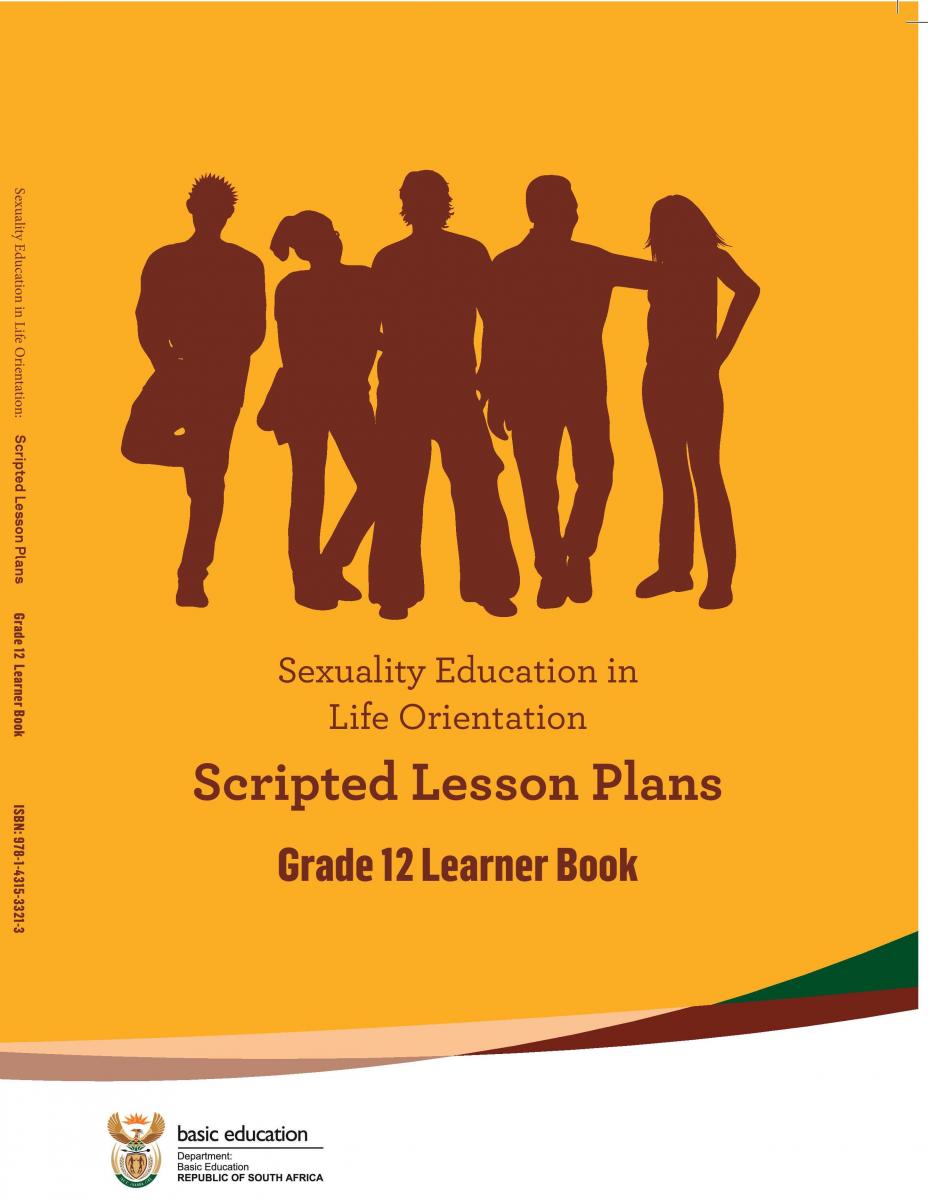 "Since the programme has been in place I feel the children are more open and talk about these issues [sexual-related matters]. Last year a group of girls came to me and explained that there was a boy who was sexually assaulting them in the way that he was touching them. I told the girls to write down what they had experienced and lodge a complaint. The learners were able to do so confidently,” she said.
"Since the programme has been in place I feel the children are more open and talk about these issues [sexual-related matters]. Last year a group of girls came to me and explained that there was a boy who was sexually assaulting them in the way that he was touching them. I told the girls to write down what they had experienced and lodge a complaint. The learners were able to do so confidently,” she said.
Annamalai also teaches her pupils how to enforce saying no when they are abused or harassed.
She added that the lesson plans have helped pupils understand their body changes.
“The scripted lesson plans also guide and empower educators to discuss topics that could otherwise be found to be uncomfortable,” said Annamalai.
Morris Isaacson High School is one of the schools where the scripted lessons progamme was piloted. The department initially piloted the scripted lesson plans in schools in 10 districts in the Free State, KwaZulu-Natal, Gauteng, Mpumalanga and the Western Cape.
Sexuality and sexual behaviour change
The aim of scripted lesson plans is to ensure that learners are given an understanding of concepts, values and attitudes related to sexuality and sexual behaviour change.
The lesson plans are included in the life orientation curriculum and provide age-appropriate material to guide learners in adopting safe and healthy choices.
The DBE plans to use the lessons as a tool to curb early unintended pregnancies and to teach young learners about their bodies and what constitutes gender-based violence.
“In grades four, five and six, we deal with the topic of development of self,” said the DBE’s Director of Health Promotion Muzi Ndlovu.
In grade four, the topic is "respecting my body and the bodies of others.'' Pupils learn about positive self-image, the influence of peers and adults and the importance of not subjecting the body to substance abuse.
In grade five, pupils are taught how outside influences, such as TV, impact how they view themselves. In grade six, they learn about how others might have a different view of their bodies.
“They must learn to accept others as they are,” Ndlovu said.
According to figures from the District Health Information System, in the 2017/18 financial year, 117 051 young women between the ages of 10 and 19 had fallen pregnant. Of these, over 2 500 were between the ages of 10 and 14.
Ndlovu said the department sought to find a way of curbing the high pregnancy rate which leads to a third of girls who fall pregnant permanently dropping out of school.
Juggling school and motherhood
Teenage mother Elam Nopote (17) said giving birth at 16 meant that she had to drop out of school. Nopote, who is from Butterworth in the Eastern Cape, said as a full-time mother she cannot juggle parenthood, a social life and school.
"When I fell pregnant I did not have enough information about the implications of having unprotected sex."
She said it was good that the lesson plans were being introduced at schools as they will equip young people on sexuality and sexual behaviour.
Did you know?
The department's scripted lesson aims to strengthen the teaching of life orientation.
The Auditor-General of South Africa
The Auditor-General of South Africa LondekileChapter 9 of the Constitution of the Republic of South Africa, 1996, established the Auditor-General of South Africa (AGSA) as one of the state institutions supporting Constitutional democracy. The Constitution entrenches our independence by making us subject only to the Constitution and the law.
The Constitution also instructs that we be impartial, exercise our powers and perform our functions without fear, favour, or prejudice.
We therefore have a Constitutional mandate and, as the Supreme Audit Institution of South Africa, exist to strengthen our country’s democracy by enabling oversight, accountability and governance in the public sector through auditing, thereby building public confidence.
What are the functions of the AGSA?
The AGSA audits and reports on the accounts, financial statements and management of:
- All national and provincial state departments and administrations
- Administration of Parliament and of each provincial legislation
- All municipalities and municipal entities
- All constitutional institutions
- Any other institution or accounting entity required by national or provincial legislation to be audited by the AGSA.
What types of audits does the AGSA conduct?
Mandatory audits and discretionary audits.
Mandatory audits:
Regularity audits
- Report on the financial statements and the performance report
- Report on compliance with laws and regulations
Discretionary audits:
Investigations
- Report findings with regard to financial misconduct, maladministration and impropriety; based on allegations or matters of public interestPerformance audits (including environmental audits)
- Report on the economic, efficient and effective utilisation of scarce resources
- Report on the effect of policy implementation excluding policy evaluation
What is the extended mandate of the AGSA?
The AG has the power to:
- refer material irregularities to the relevant bodies for further investigation in accordance with their mandate
- take binding remedial action for failure to implement the AG’s recommendations regarding material irregularities.
- issue a certificate of debt for failure to implement the remedial action if financial loss was involved.
What is a material irregularity?
A material irregularity (MI) is any non-compliance with, or contravention of, legislation, fraud, theft or a breach of a fiduciary duty identified during an audit performed under the Public Audit Act (PAA) which resulted in or is likely to result in a material financial loss, the misuse or loss of a material public resource or substantial harm to a public sector institution or the general public.
What is the difference between a material irregularity and irregular expenditure?
- Irregular expenditure is expenditure incurred in contravention of, or not in accordance with, a requirement of any applicable legislation.
- An MI is any non-compliance with, or contravention of legislation, fraud, theft or a breach of a fiduciary duty identified during an audit performed under the PAA which resulted in, or is likely to result in, a material financial loss, the misuse or loss of a material public resource or substantial harm to a public sector institution or the general public.
Be on the lookout for the next edition!
For more information on the AGSA, visit our website and social media platforms:
twitter: @AuditorGen_SA
Instagram Auditor-General South Africa
The ins and outs of ADHD and ADD
The ins and outs of ADHD and ADD SiboneloIf a child who suffers from attention deficit hyperactivity disorder (ADHD) or attention deficit disorder (ADD) is not treated, the conditions could have long-term negative impacts on their health.
This is according to Dr Khatija Jhazbhay, who heads up the Child and Adolescent Psychiatry Unit at Townhill Hospital in Pietermaritzburg.
She explained that as adults, these children could be at an increased risk of other mental conditions, such as anxiety and depression, and could also misuse substances.
ADHD and ADD affect children’s academic progress and their behaviour could annoy others. Children could also be disliked, get into trouble and be prone to accidents.
“Each child’s circumstances are unique and developing, so it’s important to do a comprehensive clinical assessment to recognise other factors that could be impacting their development, as well as the strengths that can be built on to assist them to reach their full potential,” said Dr Jhazbhay.
She explained that ADHD and ADD are neurodevelopmental disorders that present with behavioural difficulties, such as inattention.
This shows in the form of:
- making careless mistakes
- not completing tasks
- losing things
- being easily distracted and forgetful
Examples of hyperactivity or impulsiveness include:
- fidgeting
- tapping hands or feet
- squirming in their seat
- blurting out answers and getting up when expected to remain seated.
“Symptoms present in two or more settings – at home, school, with friends or relatives or during other activities – and interfere with social, occupational or school functioning. Severe symptoms present before the age of 12 and must be present for at least six months.
Teachers are able to pick up behaviour difficulties and can refer a child for clinical assessment. There are various treatment options that can be considered.
In a box
For information about ADHD and ADD, contact the Mental Health Information Line at 0800 567 567, the ADHD Helpline at 0800 55 44 33 or the South African Depression and Anxiety Group at 0800 456 789. You can also visit your doctor or local health facility.
Vacant land awarded to emerging farmers
Vacant land awarded to emerging farmers UrsulaMunicipal land that was standing empty in Stellenbosch will now be used to produce food and create jobs. 
Emerging farmers in the Stellenbosch Local Municipality are looking forward to an exciting future after municipal land, equipped with everything they need to start growing crops, was handed over to them.
Approximately 120 hectares of vacant municipal farming land was transferred to five successful land applicants in November 2019. They were given leases of between nine and 11 years, after which they will have the chance to renew their leases, provided that the land was productively used.
The successful applicants all come from disadvantaged backgrounds, in line with the municipality’s policy on the management of municipal agricultural land.
One of the emerging farmers is Viktor Roberts from Elsenburg. Roberts, who is a member of a co-operative called Elsenburg Khoisan Farmers is looking forward to maximising the opportunity he has been given.
“We have struggled to access land in the past, so this is a great victory for us. We plan to grow a variety of crops and are grateful to the municipality because this will give the farmers a chance to start earning income,” said Roberts.
He added that the farmers will make sure the land is productive so that their leases can be renewed.
“We want this land to create many jobs, equip members of the community with valuable skills and be a sustainable source of income for years to come.”
To get the farmers ready for turning the land into productive farmland, the municipality is ensuring that vital infrastructure, such as electricity and water systems, is in place. The successful applicants will enjoy a 20 percent discount on relevant municipal tariffs.
Stellenbosch Executive Mayor Gesie van Deventer explained that Stellenbosch’s agricultural land policy focuses on including up-and-coming farmers in the region’s thriving agricultural sector.
“Our goal is to enable emerging farmers to access municipal agricultural land and to ensure the optimal use of every patch of available agricultural land within the Stellenbosch municipal area.”
Van Deventer said that the municipality is providing as much support as possible to the emerging farmers.
“We will also play a facilitating role between the farmers and stakeholders, such as the Department of Agriculture and agricultural groups.”
The next step in the process will be advertising another five pieces of municipal agricultural land in the local media.
Walking Bus programme keeps children safe
Walking Bus programme keeps children safe angenithaAll in line! Let’s go! Community volunteers ensure that children get to school and back safely by accompanying them on their journey.
Over 3 000 parents and volunteers in the Western Cape are playing a proactive role in keeping children safe, by walking groups of children to school and back.
The provincial Department of Community Safety launched the Walking Bus initiative as a pilot project back in 2016. Since then, the project has drawn support from thousands of people across the province.
It currently runs in around 80 areas, most of which are affected by gang-related activities. Participants are trained in conflict resolution, first aid and road safety to enable them to deal with challenging situations. They also receive high-visibility jackets and radios that allow them to be in contact with other volunteers and law enforcement officers.
Sylvia Visagie is a Walking Bus volunteer in the Happy Valley community on the Cape Flats.
“It can be dangerous for our children to walk to school, especially in the mornings. We have had incidents in which criminals hide in the bushes and then rob the children of their school shoes and bags. Now that we have started the Walking Bus initiative and have received training, our children are kept safe when they walk to and from school,” said Visagie.
Gershwin Williams, a learner at the Happy Valley Primary School, said she is happy that her school principal decided to become involved in the project.
“Every day we hear of people getting raped or murdered and it can’t go on like this. So the Walking Bus is now a part of our lives and the principal made a good decision to bring it in for our safety,” said Williams.
The Department of Community Safety said that the South African Police Service has reported a remarkable difference in the rate of petty crime in areas where the Walking Bus project is active.
The initiative has also proven effective in preventing children from bunking school or engaging in unhealthy behaviour.
Schools, parents or volunteers in the Western Cape who are interested in starting the Walking Bus project in their communities, may contact Jemayne Andrews on 021 400 1300
Work hard on your studies from today
Work hard on your studies from today JoyLearners are advised to approach each day of the schooling year as if they are writing an examination the next day.
This advice comes from the Deputy Minister of Basic Education, Dr Makgabo Reginah Mhaule, who said in order for learners to achieve desirable marks at the end of the year, they must start taking education seriously from the beginning of the first quarter.
“It is dangerous for learners to start a year with the attitude that there is still a lot of time for them to study because the year has just begun. They must start studying as if they are preparing for final examinations,” she said.
Her message was directed at learners in all grades, not just Grade 12.
“All the grades must be taken seriously because you start building up from Grade R to Grade 12,” the Deputy Minister said.
When it comes to teachers, she said it is important that they cover all aspects of the curriculum.
The Deputy Minister said it is important for both teachers and learners to be tolerant of each other because the generation gap can sometimes cause conflicts.
She called on parents to support their children in their studies and to create a conducive environment for learning.
“Parents must support teachers. We cannot leave our children with teachers and when we are called to attend meetings at school, we do not attend. It is a parent’s responsibility to attend all school events that involve them in order to know who the teachers are and to get information about their children’s behaviour at school,” she said.
The class of 2020
She had a special message for the matric class of 2020.
“Acknowledge the 11 years that you have travelled to get to Grade 12. Do not let all the work that you have done over the years go to waste. The class of 2019 has set the bar high. Raise the bar. Do not lower the standard,” she said.
She encouraged learners to form study groups as early as the first quarter so that they can do well at the end of the year.
Class of 2019
In the beginning of the year, President Cyril Ramaphosa congratulated the class of 2019 on achieving an 81.3 percent matric pass rate, which is the highest since the advent of democracy in 1994.
- Free State - 88.4 percent
- Gauteng - 87.2 percent
- North West - 86.8 percent
- Western Cape - 82.3 percent
- KwaZulu-Natal - 81.3 percent
- Mpumalanga - 80.3 percent
- Eastern Cape and North Cape - 76.5 percent
- Limpopo - 73.2 percent.